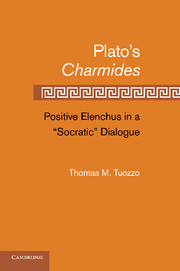Book contents
- Frontmatter
- Contents
- Acknowledgments
- Part One Approaching The Dialogue
- Part Two Approaching The Argument
- Part Three The Dialectical Investigation
- 5 σωϕροσύνη and Its Value
- 6 σωϕροσύνη as Self-Knowledge: Two Reformulations
- 7 Possibility of Self-Knowledge: Critian Formulation
- 8 Possibility of Self-Knowledge: Socratic Formulation
- 9 Return of the Value Question
- 10 Socrates??? Final Speech and Closing Scene
- 11 σωϕροσύνη, Knowledge, and the Good
- Works Cited
- General Index
- Index of Passages
8 - Possibility of Self-Knowledge: Socratic Formulation
Published online by Cambridge University Press: 05 February 2012
- Frontmatter
- Contents
- Acknowledgments
- Part One Approaching The Dialogue
- Part Two Approaching The Argument
- Part Three The Dialectical Investigation
- 5 σωϕροσύνη and Its Value
- 6 σωϕροσύνη as Self-Knowledge: Two Reformulations
- 7 Possibility of Self-Knowledge: Critian Formulation
- 8 Possibility of Self-Knowledge: Socratic Formulation
- 9 Return of the Value Question
- 10 Socrates??? Final Speech and Closing Scene
- 11 σωϕροσύνη, Knowledge, and the Good
- Works Cited
- General Index
- Index of Passages
Summary
Continuing the Conversation
As we saw in Chapter 6, after the great speech in which Critias presented self-knowledge as his account of σωϕροσύνη, Socrates conducted a scrutiny of that account, which led to two new formulations of it: the Critian and the Socratic. Socrates then launched the discussion on a new beginning, saying that they must treat first the possibility and then the advantageousness of σωϕροσύνη understood as self-knowledge. Socrates first discusses the possibility question with respect to the Critian formulation. As we saw in Chapter 7, Socrates focused on the reflexive aspect of this formulation, that is, the respect in which the knowledge of itself and other knowledges takes itself as its object. The investigation into the possibility of such a thing revealed the need to locate knowledge within a dialectical division of relatives. To do that, as I have argued, would require determining the substantive, nonrelative nature to which knowledge is related.
- Type
- Chapter
- Information
- Plato’s CharmidesPositive Elenchus in a 'Socratic' Dialogue, pp. 236 - 254Publisher: Cambridge University PressPrint publication year: 2011



